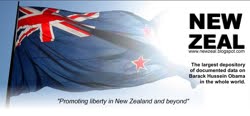The lead to this story came from Jihad Watch. This is from the Christian web site of the Acts 17 Apologetics Ministries.
Answering Muslims
The Islamoblog of Acts 17 Apologetics Ministries
Free Speech Victory in Dearborn, Michigan!
Thursday, May 26, 2011
Maybe I shouldn't say "in" Dearborn, since the city only sought to suppress free speech in this case. An outside court (the United States Court of Appeals) had to impose Constitutional law on the city.
Dearborn hosts an annual Arab Festival on Warren Avenue. During the festival, the street is reserved, but the adjacent sidewalks are not reserved and therefore remain public property. Hence, prior to 2009, many people would distribute pamphlets, DVDs, CDs, etc., on the public sidewalks. However, when Ronald Haddad took over as Chief of Police, he announced that no one would be allowed to distribute materials on the public sidewalks. Indeed, he insisted that no one would be allowed to distribute materials within five blocks of the festival. (He justified his decision by claiming that he needed to keep the area clear for pedestrian traffic.)
From a Constitutional perspective, this was quite disturbing, as the government was officially limiting free speech on public sidewalks. Moreover, those of us who attended the festival noticed that security only enforced the policy on Christians. Muslims remained free to distribute their materials.
Pastor George Saieg, an Arab Christian from the Sudan (who has observed the effects of Islamic law in his home country and therefore understands the importance of free speech better than many of us) decided to take the case to court. The freedom fighters at the Thomas More Law Center (praise God for them) took the case free of charge, and they won.
Lower courts had ruled in favor of Dearborn (i.e. that Dearborn police could stop people from exercising their freedom of speech on the public sidewalks adjacent to the festival). The appeals court reversed the decision on Constitutional grounds. Here are two excerpts:
On the free speech claim, we REVERSE the district court’s grant of summary judgment to the defendants and its denial of summary judgment to the plaintiffs. We thereby invalidate the leafleting restriction within both the inner and outer perimeters of the Festival.1 The restriction on the sidewalks that are directly adjacent to the Festival attractions does not serve a substantial government interest. The City keeps those same sidewalks open for public traffic and permits sidewalk vendors, whose activity is more obstructive to sidewalk traffic flow than pedestrian leafleting is. Moreover, the prohibition of pedestrian leafleting in the outer perimeter is not narrowly tailored to the goal of isolating inner areas from vehicular traffic. The City can be held liable because the Chief of Police, who instituted the leafleting restriction, created official municipal policy. . . .Interestingly, the court even recognized that the penalty for leaving Islam is death. They state:
The leafleting restriction is not a reasonable time, place, and manner restriction. In the inner perimeter, the restriction does not serve a substantial governmental interest. In the outer perimeter, the restriction is not narrowly tailored. The defendants therefore violated Saieg’s First Amendment right to freedom of speech. Absent an injunction, Saieg will continue to suffer irreparable injury for which there is no adequate remedy at law. As a result, on the free-speech claim, we REVERSE both the district court’s grant of summary judgment to the defendants and its denial of summary judgment to the plaintiffs.
In 2009, Saieg had planned for 90 ACP members to continue the practice of leafleting while roaming the Festival. However, when Saieg shared these plans with a City police sergeant, Saieg learned that the new Chief of Police, Chief Haddad, would not permit anyone to distribute leaflets while walking around the Festival. Instead, the City provided the ACP with a booth, waiving the standard fee. The booth was poorly lit and located by carnival rides, which attracted mostly children. This problem was remedied in 2010, when the ACP’s booth was lit and located “in the central area.” Saieg v. City of Dearborn, 720 F. Supp. 2d 817, 834–35 (E.D. Mich. 2010) (describing then- upcoming plans for the 2010 festival). Saieg also faces a more basic problem with booth-based evangelism: “[t]he penalty of leaving Islam according to Islamic books is death,” which makes Muslims reluctant to approach a booth that is publicly “labeled as . . . Christian.” R. 48 (Ex. A: Saieg Dep. at 75). Saieg believes that evangelism is more effective when he can roam the Festival and speak to Muslims more discreetly. The ACP distributed 37,000 packets of religious materials in 2007 and 20,000 packets in 2008, but only 500 packets in 2009 due to the remote, fixed location. Numbers from 2010 are not in the record. (Click here to read the entire ruling.)Hence, at the festival next month, police will no longer be permitted to interfere with Constitutionally protected free speech activities. Additionally, the city may now be held liable for damages to anyone whose rights were violated by police at the festivals. That has profound implications for our own case against the city, which is based, in part, on the following incident:
Go to the Act 17 Apologetics Ministries web site to view the accompanying videos that tell the story of what led to this court ruling.



























